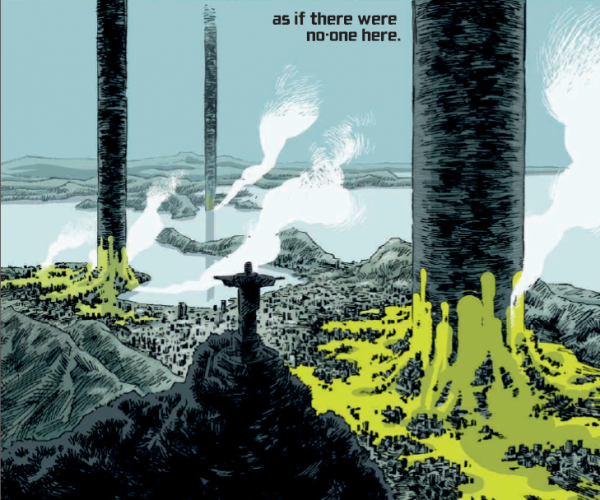Warren Ellis is a living legend. To quote the man himself, “I am a messiah. Ask anyone on the internet.” Among his works are the Hunter S. Thompson-inspired postcyberpunk comic series Transmetropolitan which predicted everything from 3D printers to the 2016 Presidential Election and the series Planetary which remains perhaps the greatest exploration of twentieth-century pop culture since Alan Moore and Dave Gibbons released The Watchmen back in 1987. Ellis is a genius, and—once again letting him describe himself—a “perpetually disappointed optimist.” I have personally heard him tell a stranger they should be drowned in the River Thames for asking a stupid question, and yet I can also vouch for the fact that the man gives surprisingly good hugs (though revealing this may very well get me thrown in the Thames) . But most of all, Warren Ellis is a man who stared into the cataracts of the future’s omnivisional potential and didn’t blink.

Which brings me to the future of one of his ongoing series: Trees.
In his newsletter, Orbital Operations, Ellis recently wrote the following:
“I started writing TREES Volume 3 recently. It will be five issues long. Probably. Sometimes TREES stories add issues in the telling of them. But I’m aiming for five, and I’m a couple of issues in. It’s a slight change of style. I was bogged down in it for a long while, and then realised I was writing the wrong story, which was why it wasn’t taking on life. It didn’t want to be written. A few days later, I had the right story come to me, and, after a single note from Jason [Howard], I had the whole shape of it and it flew together.”
Ellis and Howard have an upcoming book, Cemetery Beach, which they describe as “an action book,” and “a palate-cleanser from TREES.” So whatever Trees volume three will be, it won’t be an action book. But to understand what comes next, let’s recap on the series so far.

Trees explores the idea of what would happen if aliens invaded Earth and they were so much larger than Earthlings that they gave us no more mind than we give ants. In this case, the aliens are giant pillars reaching high into the clouds, commonly referred to as “Trees.” So far, the series has spanned two volumes and fourteen issues, focusing on different people around the globe going about their daily lives in the shadow of these giant alien pillars from outer space. Among these are a Norwegian research team studying the one of the Trees, a corrupt politician trying to run New York after the landing of a Tree turned the city into (even more of) a dystopian police state, and two young lovers in a Chinese artists’ commune.
Because this is Warren Ellis, pretty much all of these stories come to a dark ending (though, truth be told, many of them have not yet ended, it seems). Police brutality, military attacks against civilians, fascist youth gangs, and illegal military operations against neighboring countries are central plot points in the book. These are favorite themes which Ellis returns to frequently, but they also tie into another concept which I got to hear him speak about back in 2016 while he was on a book tour in the United States for his novel Normal.
The concept is exopolitics, the field of study interested in political policies concerning extraterrestrials.
While speaking in North Carolina, Ellis mentioned this was a major point of research for his work on the then-upcoming comic book series The Wild Storm which he was writing for DC Comics. It is true that exopolitics features heavily in The Wild Storm, but it is just as important a theme in Trees.

Any time writers examine other cultures and how humans interact with them, they are really interrogating humanity. To define what is not human, one must understand what humanity is. Exopolitcs is therefore a method of interrogating—and legislating—our own humanity as we are forced to make contact with things that are other from ourselves. Ultimately, legislation must preserve that which needs preserving and defend against threats that could destroy it.
This then raises the question of what are the dangers threatening humanity—both from within and without.
Again, Ellis has stated this won’t be an action book, but it looks like it will continue to explore violence. His critiques of police violence, the rise of fascist gangs, and military abuses of power will probably continue, but there is another element in his work that has been woven through these narratives that seems likely to be further explored: gender politics.
There have been a number of strong women who appeared in the first volume of Trees, including the Chinese trans woman Zhen in the aforementioned artists’ colony and an Italian cis woman named Eligia whose boyfriend was the local fascist gang leader. Both women’s stories were almost absent from volume two. During the first volume, one triumphed over her violent abuser, while the other barely survived a military strike. But it seems that this is the perfect place to pick up the story. Because the story of Trees is about facing the unknowable—something which doesn’t acknowledge the value of one’s humanity. Whether that something is a giant alien Tree, or a fascist, or an abuser, or the military, the struggles are real. (Okay, giant alien Trees are a fictional threat, but these towering erect pillars make one helluva great metaphor for the real world threat of the patriarchy.)
It’s not just narrative potential that makes me think Ellis will go this route and Ellis’ own political interests, there is also evidence from the books he has been plugging. Ellis has a habit of recommending books to his fans, and on his Amazon recommendations is the 2017 book Witches, Sluts, Feminists: Conjuring the Sex Positive by Kristen J. Sollee. Notably, a number of books here seem to be attached to the inspiration for other projects (such as The Complete Dramatic Works of Samuel Beckett, which Ellis has said inspired elements of his comic Shipwreck).

Additionally, there is a feminist narrative arc that many of Ellis’ best works seem to gravitate toward. Some of his other current ongoing series such as The Wild Storm and Injection feature female leads throughout the titles’ large ensemble casts.
Furthermore, one should consider the metaphorical narrative of challenging the giant phallic symbols of power and violence dominating the land which could be countered by the strength of deep roots (archetypically associated with the feminine).
Of course, I could be wrong totally about this.
I have not spent as much time staring into the future as Ellis has, nor even contemplating all the forms of violence that can be inflicted with a selfie stick. He could decide to focus more on migrant crises to discuss the displaced peoples of his fictional world paralleling ours, or the isolationist tendencies populism espouses to showcase his contempt for BREXIT. Or he could take it in some totally different direction.
Whatever Ellis does with the series, it will be interesting to see how the story branches off in new directions.